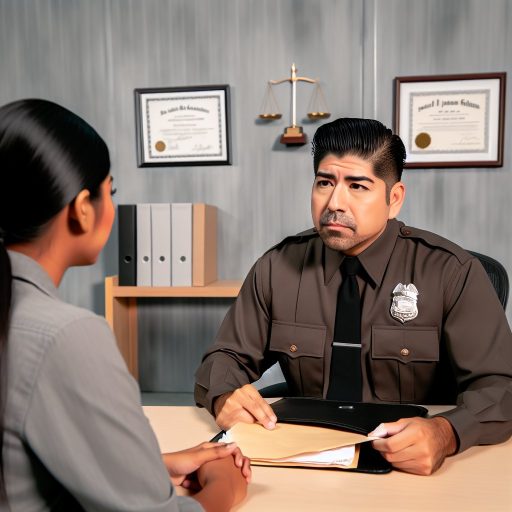Introduction
Are you interested in becoming a licensed private investigator?
If so, this guide will help you navigate the steps.
A licensed private investigator conducts surveillance, gathers evidence, and verifies information for various clients such as individuals or businesses.
Obtaining a license as a private investigator demonstrates your commitment to ethical standards and professionalism.
It also provides credibility to your work and allows you to legally operate in your state.
Researching the Requirements
When considering becoming a licensed private investigator, the first step is to research the specific requirements in your state.
Keep in mind that these requirements can vary from state to state.
It is crucial to understand what is needed in your particular area.
State Variations
As mentioned, different states have different criteria for obtaining a private investigator’s license.
Some states may require a certain level of education, while others may prioritize work experience in a related field.
By understanding these variations, you can prepare yourself accordingly.
Education and Experience
In some states, a certain level of education is necessary to become licensed as a private investigator.
This could include a college degree in criminal justice or a related field.
Additionally, many states require a minimum number of years of experience working in investigations or a related field.
Exams and Background Checks
Before obtaining a private investigator’s license, you may be required to pass certain exams or undergo background checks.
These exams are designed to test your knowledge of investigative techniques and procedures.
Background checks are conducted to ensure that you have a clean criminal record and are fit to work as a private investigator.
Education and Training
Once you have a clear understanding of the requirements in your state, you can begin pursuing the necessary education and training to become a licensed private investigator.
College Degree
In many states, a college degree is a basic requirement for obtaining a private investigator’s license.
A degree in criminal justice, law enforcement, or a related field can provide you with the foundational knowledge needed to succeed in this profession.
Transform Your Career Today
Unlock a personalized career strategy that drives real results. Get tailored advice and a roadmap designed just for you.
Start NowTraining Programs
In addition to a college degree, you may also benefit from enrolling in specialized training programs for private investigators.
These programs can offer hands-on experience and additional knowledge in areas such as surveillance, evidence collection, and report writing.
Internships and Work Experience
Gaining practical experience through internships or entry-level positions in the field of investigations can be invaluable.
This hands-on experience can help you develop the skills and expertise needed to become a successful private investigator.
Exam Preparation
Before you can become a licensed private investigator, you may need to pass one or more exams that test your knowledge of investigative techniques and procedures.
Study Materials
To prepare for these exams, it is essential to utilize study materials like textbooks, online resources, and practice exams.
These resources can help you review key concepts and ensure that you are adequately prepared.
Practice Exams
Taking practice exams can be an effective way to assess your knowledge and identify areas where you may need to focus more attention.
Practice exams can simulate the actual testing conditions and help you gauge your readiness.
Review Sessions
Consider participating in review sessions or study groups with other aspiring private investigators.
These sessions can provide valuable insights and advice, as well as the opportunity to collaborate with peers and enhance your understanding of the material.
Background Checks
In addition to passing exams, you may also need to undergo a thorough background check as part of the licensing process for private investigators.
Criminal Record Check
A criminal record check is typically conducted to ensure that you have a clean criminal history and are eligible to work as a private investigator.
Any prior convictions or legal issues could potentially disqualify you from obtaining a license.
Character Assessment
In some states, a character assessment may also be required as part of the background check.
This assessment is designed to evaluate your personal integrity, honesty, and ethical standards, which are essential qualities for a successful private investigator.
Reference Checks
During the background check process, you may be asked to provide references who can vouch for your character and professional abilities.
These references should be individuals who can attest to your qualifications and suitability for the role of a private investigator.
Licensing Application
Once you have met all the requirements, including education, experience, exams, and background checks, you can proceed with submitting your licensing application.
Application Forms
The licensing application typically involves filling out forms provided by the state licensing board.
Transform Your Career Today
Unlock a personalized career strategy that drives real results. Get tailored advice and a roadmap designed just for you.
Start NowThese forms will require you to provide personal information, details about your education and experience, and any other relevant documentation.
Application Fee
In addition to completing the forms, you will also need to pay an application fee.
This fee covers the cost of processing your application and is non-refundable.
It is essential to make sure you have all the necessary information and documentation before submitting your application.
Waiting Period
After submitting your licensing application, there is usually a waiting period before you receive a response from the licensing board.
During this time, the board will review your application, conduct any necessary checks, and make a decision on whether to grant you a private investigator’s license.
Continuing Education
Once you have obtained your private investigator’s license, it is essential to stay current with developments in the field.
Continuing education helps enhance your skills and knowledge.
Professional Development
Participating in professional development opportunities, such as workshops, seminars, and online courses, can help you stay abreast of new techniques, tools, and best practices in the field of investigations.
Networking
Building a strong network of contacts within the industry can also be beneficial for private investigators.
Networking can provide opportunities for collaboration, mentorship, and referrals, as well as help you stay connected to the latest trends and developments in the field.
License Renewal
Most states require private investigators to renew their licenses periodically.
This process typically involves completing a certain number of continuing education credits and paying a renewal fee.
By staying current with your license renewal, you can ensure that you remain in good standing as a licensed private investigator.
Implications of Becoming a Licensed Private Investigator
Becoming a licensed private investigator requires careful planning and dedication.
It is a commitment to meeting the necessary requirements.
Researching the requirements in your state is paramount.
You should also obtain the required education and experience.
Passing exams and undergoing background checks is also essential.
By following these steps, you can embark on a rewarding career in the field of investigations.
Transform Your Career Today
Unlock a personalized career strategy that drives real results. Get tailored advice and a roadmap designed just for you.
Start NowRemember to continue your education and professional development to stay current with industry trends and practices.
Meet the Eligibility Criteria
Before you can become a licensed private investigator, you must meet certain eligibility criteria.
Here are some of the key requirements:
- Fulfill the minimum age requirement
- Obtain the necessary education or work experience
- Ensure you have a clean criminal record
Fulfill the Minimum Age Requirement
First and foremost, you must be of legal age in order to become a licensed private investigator.
The minimum age requirement can vary depending on your location, so be sure to check the specific requirements in your area.
Obtain the Necessary Education or Work Experience
In addition to meeting the minimum age requirement, you may also need to obtain a certain level of education or work experience.
This can include a high school diploma or GED, as well as relevant experience in a related field such as law enforcement or security.
Ensure You Have a Clean Criminal Record
Another important aspect of becoming a licensed private investigator is ensuring that you have a clean criminal record.
This typically involves undergoing a background check to verify that you have not been convicted of any disqualifying offenses.
By meeting these eligibility criteria, you can take the first steps towards becoming a licensed private investigator and pursuing a career in this field.
Discover More: Crime Scene Investigator Role in Court Testimonies
Enroll in a Training Program
Becoming a licensed private investigator requires a combination of education, training, and experience.
One of the first steps in this process is to enroll in a training program.
This will provide you with the necessary knowledge and skills to succeed in this field.
When looking for a training program, it is crucial to find a reputable institution that offers a quality curriculum.
The program should cover topics such as investigation techniques, legal principles, and ethical standards.
Additionally, make sure that the program meets the licensing requirements set by the state where you plan to work as a private investigator.
Participating fully in the training program is essential to your success.
Be sure to engage in all aspects of the program, including classroom lectures, hands-on exercises, and any practical experiences offered.
By fully immersing yourself in the training, you will gain a solid foundation of knowledge and skills that are vital for a career as a private investigator.
Transform Your Career Today
Unlock a personalized career strategy that drives real results. Get tailored advice and a roadmap designed just for you.
Start Now- Find a reputable institution that offers a private investigator training program.
- Make sure the program meets the state’s licensing requirements.
- Participate fully and learn all the necessary skills.
You Might Also Like: Cybersecurity Specialist vs. Cybersecurity Analyst: Key Differences
Pass the licensing exam
Passing the licensing exam is a crucial step in becoming a licensed private investigator.
Here’s how you can prepare for and successfully pass the exam.
Study Diligently for the Exam
Start by gathering study materials such as textbooks, online resources, and practice exams.
Create a study schedule that allows you to review the material thoroughly and consistently.
Focus on key topics such as laws and regulations related to private investigations, surveillance techniques, and ethical standards.
Take notes, create flashcards, and engage in group study sessions to reinforce your understanding of the material.
Take Practice Exams to Prepare
Practice exams are a valuable tool for assessing your knowledge and identifying areas that require further study.
Look for practice exams that mimic the format and content of the official licensing exam.
Set aside time to take practice exams under timed conditions to simulate the pressure of the actual test.
Review your answers, identify any mistakes, and use them as learning opportunities to improve your performance.
Schedule and Take the Exam When Ready
Once you feel confident in your preparation and performance on practice exams, schedule the official licensing exam.
Choose a date and time that aligns with your study schedule and allows you to perform at your best.
Arrive early to the testing center, bring all necessary materials, and maintain a calm and focused mindset during the exam.
Remember to read each question carefully, answer to the best of your ability, and manage your time effectively to complete the exam within the allotted timeframe.
See Related Content: Benefits and Perks of Being a Border Patrol Agent

To become a licensed private investigator, there are several steps you need to follow.
Here is a detailed guide on how to navigate the application process smoothly.
Submit Required Documentation
- Gather all necessary documents, such as proof of identity and address.
- Obtain letters of recommendation from professionals in the field.
- Submit your fingerprints for a background check.
- Complete any required training or education programs.
Pay Necessary Fees
- Check the licensing board’s website for fee information.
- Make sure to have the required amount ready to submit.
- Consider additional costs, such as exam fees or renewals.
Wait for Approval
- After submitting your application, be patient and wait for approval.
- Check your email or mail regularly for updates on your application status.
- Contact the licensing board if you have any questions or concerns.
Once you have completed all the necessary steps and received approval from the licensing board, you will officially become a licensed private investigator.
Good luck on your journey!
Transform Your Career Today
Unlock a personalized career strategy that drives real results. Get tailored advice and a roadmap designed just for you.
Start NowGain More Insights: Understanding the U.S. Marshals’ Jurisdiction
Start working as a licensed private investigator
One of the first steps to becoming a licensed private investigator is to start working in the field.
By gaining hands-on experience, you will learn the ins and outs of the profession.
You will develop the necessary skills to succeed.
Another important aspect is to network with other professionals in the industry.
Building relationships with experienced investigators can provide valuable insight.
This can also lead to opportunities for growth.
On-the-job training is essential for gaining practical experience.
Many private investigation firms offer training programs or apprenticeships.
These help individuals learn the ropes and develop their expertise.
Specializing in a specific area of investigation can set you apart from others.
For example, criminal investigations or surveillance are popular areas of focus.
This specialization can attract clients seeking your specific services.
By focusing on a niche market, you can build a strong reputation.
Overall, becoming a licensed private investigator requires dedication and hard work.
You must commit to continuous learning and professional development.
By following these steps and staying focused on your goals, you can build a successful career.
Becoming a Licensed Private Investigator
Several important steps exist to become a licensed private investigator.
First, you must meet the eligibility requirements set by your state.
Next, you need to complete the necessary training and education programs.
Transform Your Career Today
Unlock a personalized career strategy that drives real results. Get tailored advice and a roadmap designed just for you.
Start NowAfter that, you must pass the licensing exam to obtain your license.
It’s crucial to emphasize the importance of obtaining a license in private investigation.
A license ensures your credibility and professionalism.
It also allows you to legally conduct investigations within the law.
By pursuing proper licensure, you demonstrate your commitment to ethical standards and trustworthiness.
I encourage readers with a passion for investigation to take the necessary steps to become licensed.
It is a rewarding career that offers the opportunity to make a difference.
You can help others while adhering to ethical principles.
Take the first step towards becoming a licensed private investigator.
Embark on a fulfilling journey in the field of investigation.
Additional Resources
SGPI Licensing | Department of Public Safety
[E-Books for Sale]
The Big Book of 500 High-Paying Jobs in America: Unlock Your Earning Potential
$19.99 • 500 High-Paying Jobs • 330 pages
Explore 500 high-paying jobs in America and learn how to boost your career, earn more, and achieve success!
See All 500 High-Paying Jobs of this E-Book
1001 Professions Without a Degree: High-Paying American Jobs You Can Start Now
$19.99 • 1001 Professions Without a Degree • 174 pages
Discover 1001 high-paying jobs without a degree! Unlock career tips, skills, and success strategies for just $19.99!




